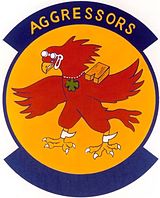65th Aggressor Squadron
65th Aggressor Squadron
 |
|
|---|---|
 |
|
| Active | 1942–1945; 1946–1958; 1969–1989; 2005–2014 |
| Country |
|
| Branch |
|
| Role | Fighter Aggressor |
| Part of | Air Combat Command |
| Engagements |
World War II (EAME Theater) |
| Decorations |
Distinguished Unit Citation (3x) Air Force Outstanding Unit Award (3x) French Croix de Guerre with Palm |
| Insignia | |
| 65th Aggressor Squadron emblem (approved 14 July 2008) |  |
| 65th Aggressor Squadron emblem (approved 16 July 1998) |  |
| Patch with 65th Fighter Squadron emblem (approved 18 December 1941) |  |
The 65th Aggressor Squadron is an inactive United States Air Force unit. It was last assigned to the 57th Adversary Tactics Group at Nellis Air Force Base, Nevada.
The 65th Aggressor Squadron was assigned 24 McDonnell F-15 Eagle aircraft, painted in camouflage schemes identical to those observed on Russian-manufactured Sukhoi Su-27 Flanker fighters and operated in conjunction with the 64th Aggressor Squadron, which performs a similar task using F-16 Fighting Falcons.
On 30 July 2008, one pilot was killed and another injured when their F-15 crashed into the ground during a training mission.
The Air Force inactivated the unit on September 26, 2014 due to Fiscal Year 2015 budget constraints imposed upon the Air Force that zero-lined the squadron's budget. Its fleet was maintained by Flanker Aircraft Maintenance Unit, a section of the 757th Aircraft Maintenance Squadron.
Formed as a P-40 Warhawk pursuit squadron in January 1941 as part of the Army Air Corps Northeast Defense Sector (later I Fighter Command) at Mitchel Field, New York. Trained in New England and provided air defense of the northeast after the Japanese attack on Pearl Harbor.
Was reassigned to the U.S. Army Middle East Force in Egypt, July 1942, becoming part of IX Fighter Command. Took part in the British Western Desert Campaign, engaged in combat during the Battle of El Alamein and, as part of Ninth Air Force, supported the Commonwealth Eighth Army's drive across Egypt and Libya, escorting bombers and flying strafing and dive-bombing missions against airfields, communications, and troop concentrations until Axis defeat in Tunisia in May 1943. The unit participated in the reduction of Pantelleria (May–June 1943) and the conquest of Sicily (July–August 1943).
...
Wikipedia
